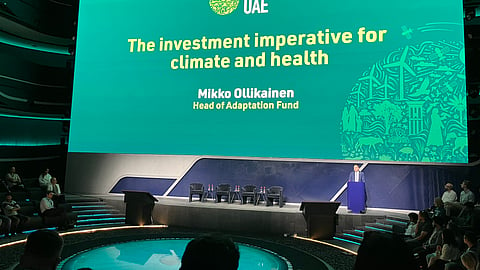

The second week of the annual UN climate change summit or COP has begun. Among other things, negotiations on fossil fuel generation are ongoing. For the first time in the history of COPs, Samoa, a Polynesian island country, called for an end to new investment in fossil fuel infrastructure, on behalf of all small island states. Smaller island states are responsible for very little greenhouse gas emissions but bear the brunt of climate emergencies.
But, the first week of the two-week conference was more than just photo ops with world leaders. The Loss and Damage Fund was operationalised, 134 countries signed the Declaration on Sustainable Agriculture, Resilient Food Systems, and Climate Action and 124 countries came together and signed the ‘Declaration on Climate and Health’. December 3 was even celebrated as World Health Day.
India did not sign the Declaration or participate in official activities on World Health Day. "That is because we need to balance our COP goals with SDG goals," said Harish Hande from SELCO Foundation. In its unofficial bid to lead the vulnerable countries against climate change, it is standing strong on protecting its agriculture and health sectors.
The non-binding declaration calls for nations to reduce their greenhouse gas emissions in the health sector “swiftly, sustainably, and substantially.”
It’s not practical for India to curb greenhouse gases for cooling in the health sector, according to PTI, because vaccines, drugs etc require cold storage rooms. “We need cold storages for storing vaccines and medicines and these are linked to making our healthcare systems resilient,” Leena Nandan, Secretary, Ministry of Environment and Forests told The Hindu, “However, suggestions that using these are contributing to climate emissions and that we must choose some fuels over the other are not acceptable.”
“If anything, we need to make health action central to climate action”, said Anumita Roy Chowdhary, Executive Director, Research and Advocacy, Centre for Science and Environment. For a country like India, we need to acknowledge the ill impacts of climate change on the population, she said. “We need to change the way we do urban planning, change the way we travel etc,” she said, adding that those need to be our priority.
Health sector experts at the COP were also quick to point out that since India is a huge exporter of generic medicines, moving towards decarbonising the sector can impact not only 1.4 billion Indians but also several populations across the world, not to mention the impact on livelihoods of those who work in the health sector. "Health tech caters mostly to those who can afford it, while the poor wait for long hours to access it," said Hande.
(Raksha Kumar is a media fellow, Asia Pacific Forum on Women, Law and Development)